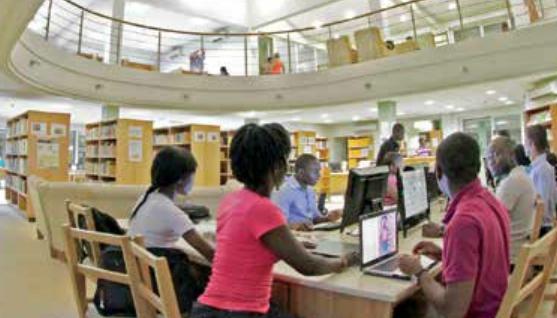How to Deal with Brain Drain
By Ronak Gopaldas

The number of private universities operating in Africa is growing, and the sector is generating a groundswell of interest among investors. In 1960, there were seven private universities in Africa, according to a 2012 statement by Olugbemiro Jegede, then Secretary General of the Association of African Universities. By 1990 there were 27, and by 2006, some 22 percent of student enrolment on the continent was at private institutions, he said.
The African Leadership University plans to build a network of 25 universities across Africa in the next 25 to 30 years that will educate 250,000 students at any one time, one of its founders, Fred Swaniker, told the website howwemadeitinafrica.com in December. A campus opened in Mauritius last year, and others are to follow in Rwanda and Nigeria between 2017 and 2019.
Another private university is the Lancaster University in Ghana, a “branch campus” of the UK institution supported by Transnational Education, which runs a Dubai-based educational foundation. Others include the Ashesi University in Ghana, the British University in Egypt and the United States International University in Kenya, all established in the last decade.
For a skilled labor force
Whats driving the growing investment in private tertiary education in Africa?
The first is related to demographics. A 2014 report by the United Nations Childrens Fund forecast that 40 percent of the worlds population may be African by 2100. By 2050, the number of Africans under the age of 18 may swell to around 1 billion. African leaders would need to make the right investments in children to build a “skilled, dynamic African labor force,” the reports leading author David Anthony told npr.com.
But student enrolment on the continent has grown faster than most governments have been able to finance, resulting in a decline in the availability and quality of education. Africa has fewer than 2,000 colleges and universities for a population of 1 billion people in 54 countries, while the United States has more than 4,000 institutions for 320 million people, Phillip L. Clay, a former chancellor of the Massachusetts Institute of Technology, told the Guardian in March. Fewer than 7 percent of Africans had college degrees as compared to 30 percent of North Americans and Europeans, he added.
Meanwhile, Africa has the fastest growing middle class in the world, according to the African Development Bank (ADB), which accords middle class status to anyone spending between $2 and $20 a day. About 327 million people, or one third of Africas population, belong to this group, a doubling in less than 20 years. By 2060, some 42 percent of the population on the continent will be middle class, according to another ADB report.
With more money available, parents and students are willing to devote a very high proportion of their income to education in Africa, said a November 2015 article for Proparco, a Paris-based development finance institution. A 2010 McKinsey report estimated that Africas private spending on education would grow by 4.9 percent between 2008 and 2020.
Second, investing in private tertiary education in Africa is good business. Claudia Costin, Senior Director for Education at the World Bank Group, told the African Higher Education Summit in Dakar, Senegal, in March 2015 that returns on investment in higher education are the highest in Africa, at 21 percent.
Third, investment in higher education will help the continent to develop and retain sources of innovation and new ideas. Currently, over 500,000 African students study overseas each year, a large percentage of them funded by government subsidies. Many do not return to their home countries. Setting up institutions in Africa would help retain talent and also afford opportunities to build centers of excellence on the continent.
Fourth, investment in private higher education would align with a growing need for analytical skills. In Africa, the public educational sector does not supply the skills that employers want, according to Professor N. V. Varghese, Director of the New Delhi-based Center for Policy Research, who has studied the growth of private universities in Africa. “The private sector in Africa offers courses which are a quid pro quo for students: they invest money and get a return immediately,” he told Times Higher Education last October.
Private higher education
Private higher education could also provide graduates with opportunities to take advantage of the continents economic potential. The low number of graduates in agriculture is striking, for instance. According to a 2011 study by the World Bank, only 2 percent of African students specialized in agriculture in 2010, though the sector contributed 13 percent to Africas GDP.
Finding high-level managerial candidates for agribusiness is almost impossible in Africa, a senior manager at a large recruitment firm who required to be anonymous told Africa in Fact. The lack of graduates in extractive industries was also striking, given the important role they play in many African countries. Private education could fill this void, leaving the government with the duties of quality control and oversight.
David Hornsby, Professor of International Relations at the University of the Witwatersrand, South Africa, told Africa in Fact African governments are facing pressure to increase their investment in higher education, but they are cash-strapped. Private funding will be required if tertiary education around the continent is to be extended.
Critics say that private institutions, particularly forprofit ones, offer courses that require limited infrastructural investment and are cheaper to deliver. They often rely on part-time academics from public institutions. And their profit-making motivation may affect the quality of the courses offered, as well as the degrees awarded. In 2013, for instance, some 66 doctorates awarded by the Kampala International University in the previous two years had not met required academic standards and were declared invalid by the Uganda National Council for Higher Education, according to a report published last year on the SciDev.Net website.
To be effective, private universities will need to be subjected to public regulation and monitoring. If governments across the continent permit private universities to be established, they will need to commit to establishing a robust monitoring and evaluation framework to protect the integrity of the system.
Private universities can play an important role in raising the continents educational profile if they are seen as complementary to public institutions, rather than as in competition with them.
(This is an edited version of the article that first appeared in Africa in Fact, the journal of Good Governance Africa, a South Africa-based research and advocacy organization)

